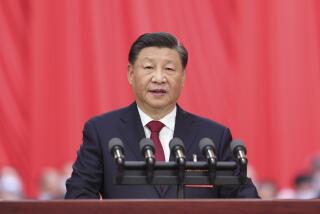NEWS ANALYSIS : China Signals an Easing of Ideological Controls : Communism: A major Politburo decision shifts the emphasis to economic development. Reformers are strengthened against the hard-liners at all levels.
- Share via
BEIJING — A warning against excessive “leftism” issued Thursday by the Communist Party Politburo marks a fundamental ideological shift with profound implications for China’s future.
Ever since the 1989 crackdown on China’s pro-democracy movement, China’s leaders have placed top priority on political repression, which was aimed at stabilizing Communist Party rule.
But Thursday’s announcement signals that this period of extremely harsh ideological controls is ending and that the emphasis is shifting to economic development.
The new party line, with its stress on economic reform, constitutes an important policy victory for senior leader Deng Xiaoping, 87, and the more reformist wing of the Communist Party. Many hard-line ideologues, however, are still entrenched in powerful positions within the party.
A key effect of the Politburo decision, summarized by the official New China News Agency in a report printed by all major newspapers, is to give reformers powerful political ammunition to use against hard-liners at all levels of government and society. It could help bring about top-level personnel changes at a party congress, scheduled for this fall.
But it also will immediately affect the tenor of political and intellectual life throughout China.
“This is very important,” a Chinese intellectual exulted Thursday after hearing the news. “Things have reached the point where China can only take the road of greater openness and freedom. This trend cannot be blocked.”
Reformers now will be able to criticize excessive concern for ideology--especially when it interferes with efforts to promote economic reforms or attract foreign investment--as a kind of phony leftism that actually undercuts the party’s interests. Those who face such attacks may be forced either to support more reformist policies or step down.
The Politburo also endorsed continued vigilance against “rightism,” an apparent reminder that attempts to overthrow communism through street protests will not be tolerated. But it declared that “the main thing to guard against is ‘leftism,’ ” the New China News Agency reported.
Reformers used a similar critique more than a decade ago to attack and discredit radical leftist leaders of the 1966-1976 Cultural Revolution. In keeping with the pattern established then, Thursday’s announcement was careful to place quotation marks around “leftism.” To Chinese readers, this is a clear reminder that the party does not view the attitudes and policies being criticized as genuine leftism, but rather as some false kind of so-called leftism.
While such semantic maneuverings may seem abstruse, they can have profound effects.
For 2 1/2 years after the June 4, 1989, crackdown on the Tian An Men pro-democracy protests, China stressed the need to fight “bourgeois liberalization” and “peaceful evolution”--code words for the gradual spread of ideas of democracy and capitalism, and the ultimate abandonment of communism. This campaign was carried out through indoctrination at schools and workplaces, strict ideological control of the media and imprisonment of dissidents.
But this harsh repression had the effect of chilling economic reforms and deterring foreign investment.
In one of the early signs of impending change, the media have been almost devoid in recent weeks of rantings against “bourgeois liberalization” and “peaceful evolution.”
The Politburo decision released Thursday included a statement welcoming at least some Western influence. It stressed that “it is . . . imperative to be bold in absorbing and learning from all the achievements of human civilization.”
Even more important, the decision stressed that “to judge whether something is ‘socialist’ or ‘capitalist’ will depend mainly on whether it will benefit the development of the productive forces under socialism, the enhancement of the comprehensive national strength of our socialist country and the promotion of the living standard of the people.”
In other words, the Politburo declared Thursday that anything that promotes economic growth is “socialist,” while any hard-line ideology that disrupts economic growth is a false leftism that must be opposed.
This ideological formulation neatly reverses the more hard-line political theories that have been dominant since the 1989 Beijing massacre. It is essentially the same formula expounded by reformist former Communist Party General Secretary Zhao Ziyang in 1987, at the peak of his power. “Things have come full circle back to Zhao’s slogans,” commented the Chinese intellectual, who spoke on condition of anonymity.
Zhao was ousted from his post as party chief in mid-1989 for allegedly sympathizing with the student protesters.
Various factors seem to have converged to cause the latest policy shift, which has been building in recent weeks. Most top Chinese leaders, and especially Deng, appear to have concluded after the collapse of communism in the former Soviet Union that the only way to preserve party rule in China is through faster economic growth, not ideological rigidity.
The severe political repression since mid-1989 also seems to have convinced the people of Beijing that street protests have no chance of overthrowing the party.
In other parts of China, the full brutality of the 1989 Beijing massacre is only dimly understood, if at all, and people are generally focused on earning money. These factors have combined to give China an enforced political stability that has reduced fears within the top party leadership.
During the last three years, an economic retrenchment policy aimed at controlling inflation and eliminating some structural imbalances in China’s economy has achieved considerable success, creating what even hard-liners such as Premier Li Peng have described as improved conditions for new reforms.
Perhaps most important, several other octogenarian power-holders who do not fully share Deng’s enthusiasm for reforms are ill and apparently almost incapacitated. This situation has given Deng one more opportunity to push for radical reforms before he, too, leaves the political stage.
Times researcher Nick Driver contributed to this report.
More to Read
Sign up for Essential California
The most important California stories and recommendations in your inbox every morning.
You may occasionally receive promotional content from the Los Angeles Times.













